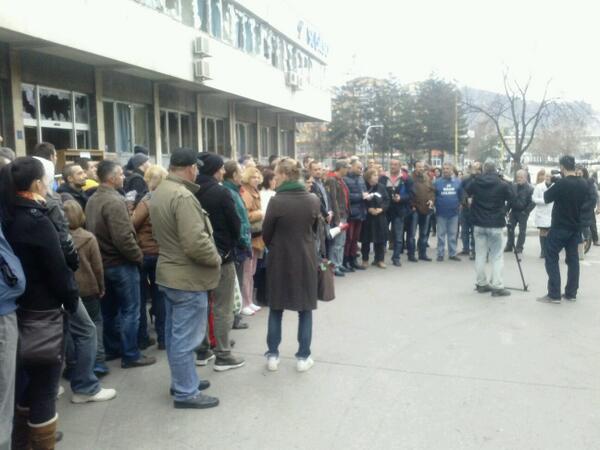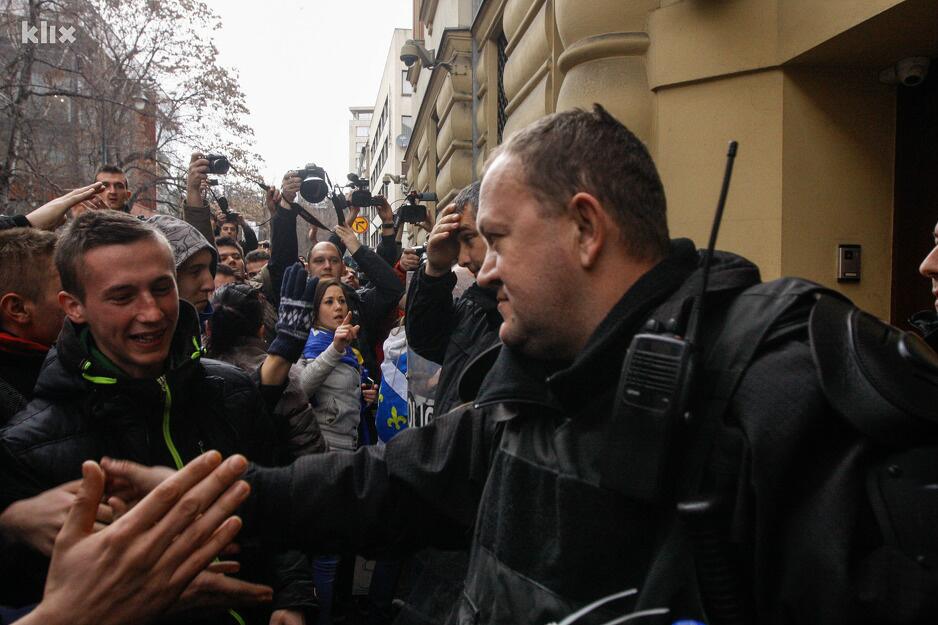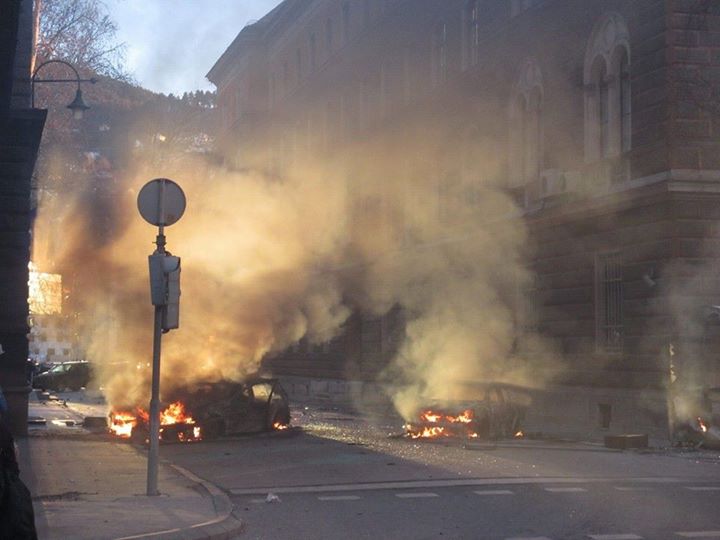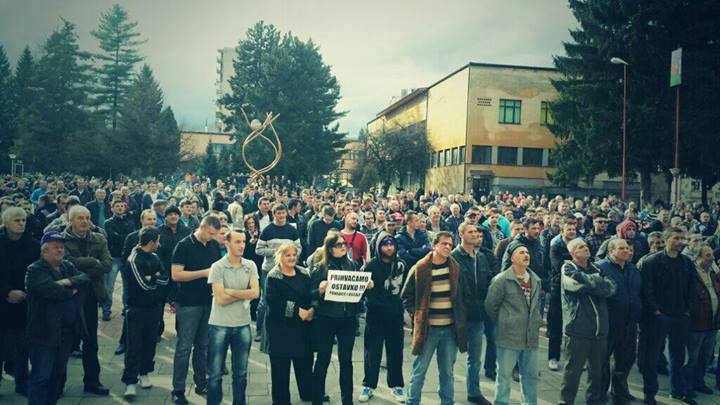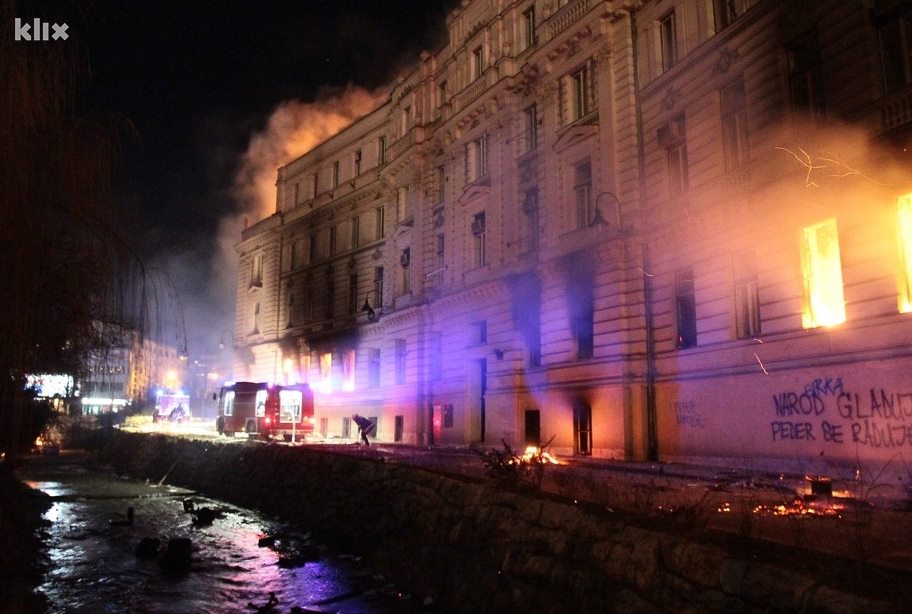Hello everyone. We’ve moved our live-ish feed here so you wouldn’t have to scroll through our entire story to get to it. Send tips and photos to editor [AT] balkanist.net.
March 11
12:45 PM CET: We’ve received unconfirmed reports that Aldin Siranovic, leader of the Udar group and one of the organizers of early protests in Tuzla, has been forced to leave Bosnia and Herzegovina with his family due to threats.

10:00 AM CET Though the eyes of the world may have turned to the Crimea, our friends over at BiH Protest files have noted the emergence of a troubling trend in Bosnia and Herzegovina over the past week: An increasing police crackdown on protesters. Hundreds of warrants have been issued for “violations of the public peace”, police are said to have “lunged” at demonstrators in Mostar, and in a separate incident pinned protesters against a wall. Police have threatened protesters with beatings, several protesters were arrested in Sarajevo on March 7, and one protester was hit with a car, and sustained light injuries. Read more.
February 28
3:40 PM CET: Milorad Dodik, president of the Serb-majority entity of Bosnia and Herzegovina has insinuated that the protests today were somehow the work of Muslim instigators, noting that tomorrow is the day Bosniaks celebrate their independence. The veterans of Republika Srpska responded by calling the statement an insult.
3:30 PM CET: The Serbian mainstream media has been completely silent about the protests in neighboring Republika Srpska. As most of you know, Serbia will hold its own elections in about two weeks, and the most powerful man in the country, Aleksandar Vucic, has been busy promoting himself in the international media as the standard bearer of regional stability. He likely fears a spillover effect should the site of thousands of Serbs protesting in Banja Luka be brought to the public’s attention.
3:00 PM CET: We’re back, reporting from an undisclosed location somewhere in Europe. The protests in Bosnia and Herzegovina have spread in much larger numbers to Republika Srpska today. A group of about 2,000 veterans gathered in Banja Luka earlier this afternoon to demand that 15 points be met, including a revision to the law on veterans, an audit of suspected criminal privatizations, the declaration of veterans as a constitutional category, the adoption of a law against money laundering, the employment of veterans, retroactive payments of all unpaid salaries to workers, and free health care for all veterans.
Photo credit: Buka.ba
February 15
11:45 PM CET: Balkan Queer initiative (@BalkanQueers) rallied in New York City’s Time Square earlier today as a show of solidarity with the people of Bosnia and Herzegovina. They took some wonderful photos of the event. A photo set is on our Facebook page.
9:10 PM CET: In Nis, the third-largest city in Serbia, a crowd of 10,000 people turned out for a march today against a recent spike in violent crime and what some say is official impunity for offenders. Anger with judges, prosecutors, and local police boiled over after a youth was stabbed to death in the street for apparently no reason. The perpetrators are believed to be football hooligans, who many in Serbia feel have long enjoyed special treatment and leniency from the authorities. Today’s protesters marched to the Nis town hall and central police building, chanting “Justice!” and calling local politicians a “gang”.
Several hundred people also gathered to protest against a rise in crime and impunity in Novi Sad, the second-largest city in Serbia. One participant carried a sign that read “F*ck the [political] campaigns, end the violence” — a reference to next month’s elections.
NOTE: It’s important to stress that today’s protests in Nis and Novi Sad were not directly linked to any of the recent events in Bosnia and Herzegovina. However, some in Serbia believe that the protesters may have been more willing to address their own local grievances given the general atmosphere of elevated discontent in the region. It’s also very rare for 10,000 people to assemble in the streets for any reason. The last time the country saw a march of that size was in 2009, after a French football fan was killed by a small group of hooligans. But the 2009 march was held in the capital of Belgrade — a city with a population four times that of Nis. Given the regional context and relative rarity of such a large event, we are posting it in this section as we continue to monitor for further developments.

8:3o PM CET: In the Montenegrin capital of Podgorica, what began as a support rally for the people of Bosnia and Herzegovina turned confrontational earlier today, as protesters called on their own government to resign.

According to the AP, clashes broke out after about “300 protesters tried to march toward the downtown government headquarters”. Some protesters threw stones, shook a police barricade, and peacefully blocked traffic by sitting in the street. The police response was, by many local accounts, pretty heavy-handed: Riot police fired off tear gas canisters, threw stun grenades at participants, and, according to photos published in the local newspaper Vijesti, appeared to forcibly drag non-violent protesters away. At least 20 people were arrested, including four minors. A statement issued by police said that said they were “taking action to identify other troublemakers”.

Echoing the frustration of many protesters in Bosnia and Herzegovina, some demonstrators in Montenegro expressed anger about the country’s lack of job prospects, low standard of living, and purportedly high levels of corruption. The youth unemployment rate is an estimated 37 percent, with an even higher rate for young women.
Two people who were in Montenegro today told me that protesters participated in the event for a number of different reasons, though corruption and organized crime was a common area of shared concern.
President Milo Djukanovic has been in power for 25 years and is widely perceived as one of the most corrupt statesmen in Europe. The Organized Crime and Corruption Reporting has written that Montenegro “seems at times like the private corporation [of Djukanovic] and his family.”
Investigative journalists and media outlets critical of Djukanovic and his inner circle have increasingly become the targets of intimidation and violence. The daily newspaper Vijesti, which frequently criticizes the government, has endured a series of arson attacks — including one as recent as Thursday. No one has ever been arrested for the arson, though incidents have been occurring with some frequency for several years. Stefan Fule, the Commissioner for EU enlargement, expressed his dismay on Twitter upon hearing news of Thursday’s attack:
#Montenegro another attack on @Vijestime how many statements&tweets it takes till it stops&media situation improves? http://t.co/HbIoD5fxQv
— Štefan Füle (@StefanFuleEU) February 13, 2014
Plans for the protest were publicized on a Facebook page called “Revolucija u Crnoj Gori. Svi na ulice” (“Revolution in Montenegro. Everyone, on the streets.”), which seems to have been deleted earlier today.
Friday
7:45 PM CET: We have the demands of the Sarajevo Plenum, which finished up a few minutes ago.
Demands for the Sarajevo Cantonal Assembly:
1) Establish an expert government,
2) Review the salaries and benefits of Sarajevo Canton officials and adjust them in accordance with current financial constraints,
3) Audit privatizations,
4) Establish an independent expert committee to clarify the facts about the events of February 7, estimate the total cost of damages, and determine the liability of police officers who used excessive force and harassed detainees.

6:30 PM CET: About 900 people are reportedly gathered in Sarajevo now for the the second plenum of Sarajevo citizens.

11:00 AM CET: We’d like to recommend several articles about the events in Bosnia and Herzegovina:
“On Fire“, by Tim Judah. Balkans correspondent for the Economist. Various other things too.
“We are Hungry in Three Languages“, by Valerie Hopkins. Journalist, currently based in Prishtina. She lived in Sarajevo for three years, reporting primarily on politics, transitional justice, organized crime and corruption. Now she covers the region.
“On Protests in BH, Quickly and Darkly“, by Eric Gordy. Professor at the School of Slavonic and East European Studies at the University of London (UCL)
“Is Change coming (Finally)? Thoughts on the Bosnian Protests“, by Florian Bieber. Professor in South East European Studies and the director of the Center for South East European Studies at the University of Graz
“It’s spring at last in Bosnia and Herzegovina“, by Jasmin Mujanovic. PhD candidate at York University and currently a Visiting Scholar at the Harriman Institute at Columbia University.
“Who Is Behind Bosnia’s Riots?“, by Lana Pasic. Independent writer and analyst from Bosnia and Herzegovina. She also works as a consultant for international NGOs like as Save the Children and OXFAM.
09:00 AM CET: 130 academics and scholars from around the world sent an open letter to the international community in Bosnia and Herzegovina: “After repeatedly calling on Bosnians to take the fate of their country into their own hands, the international community should now extend their support to protestors and seriously consider their demands.”
Thursday, February 13, 2014
10:00 PM CET: Croatian police in Zagreb arrested people at the support rally for protests in Bosnia. Several hundred people attended the event, displaying banners with messages of solidarity among peoples & “unification of the working class.” (On Twitter via @marko_boko).


According to Croatian news portal Index.hr, Zagreb police didn’t state their reasons for arresting people, including a 20-year-old girl and a 50-year-old woman.
“Workers, the unemployed, youth, and people in Bosnia have offered a brave example of how we can fight for our rights and a better society. We have half a million unemployed people in Croatia. Every other young person doesn’t have a job, people are browsing garbage bins in search for food, more and more people are becoming slaves to debt, corruption is everywhere, criminal privatizations have gone unpunished, and our democracy is a mockery” the protesters said in their announcement.
“Let’s walk out in the streets and join the struggle of people in BiH for a just society”, the protesters concluded.
8:00 PM CET: The vast majority of Bosnian citizens support the protests, the polls show. The news portal Klix.ba reports that 88 percent of citizens across Bosnia support the protests. Support is higher in the Federation of BiH (93 percent) than in Republika Srpska (78 percent).
But if the violence continues, support for the protests will likely drop below 50 percent. The majority of those who aren’t supporting the protests, say that they can’t stand behind the violent acts committed during the rallies.

Research conducted by the Valicon polling agency indicates that 90 percent of Bosnian citizens are dissatisfied with the situation in the country, half of the overall population believe that the country is heading in the wrong direction, and a third believe the country is stuck.
60 percent of citizens consider the protests to be a rebellion against the overall situation in the country, 20 percent see them as a rebellion against the ruling parties, and 13 percent consider the protests a rebellion against all political parties in Bosnia.
6:00 PM CET: Another day of protests ended. Hundreds rally in front of Bosnia’s Presidency in central Sarajevo: (On Twitter via @zy_bia)
Wednesday, February 12, 2014
6:50 PM CET: So the Sarajevo plenum was packed earlier this evening, but had to rescheduled for Friday at the Olympic Hall Zetra because of overcrowding. (On Twitter via @VALERIEin140)
4:00 PM CET: Some signs indicate that authorities may be tightening the screws on protesters nationwide. An unemployed man with a graduate degree in pharmacy was arrested after protesting the general lack of employment opportunities for educated young people in Banja Luka, Republika Srpska. He was detained and interrogated for several hours before being fined 550 KM (about 280 Euros). In the Sarajevo canton, authorities are demanding the audio/visual material of protests for use in court. And we have one unconfirmed report that a journalist’s home was searched in Mostar.
3:15 PM CET: The Global Center of Advanced Studies contacted us last night and asked us to inform our readers about an online panel discussion on the protests in Bosnia and Herzegovina scheduled for tomorrow (Thursday). Professors from the University of Tuzla, as well as researchers, activists, and professors from Croatia and Serbia will participate, and attempt to address the following questions (which I know many of you have been asking):
Are we witnessing the beginning of a potential Balkan Spring? What are the roots and causes of the recent manifestation of discontent? Which forces are involved? What are the prospects of escalation from riots to revolution in Bosnia? What needs to be done? These and other questions will be discussed with a panel of scholars and activists.
The online discussion begins at 9 PM CET (That’s 3 PM EST) and is totally free. For more details, you can visit the Facebook page for the event.
3:oo PM CET: Foreign Secretary William Hague has issued a statement calling for “urgent steps” in BiH:
“I hope that Bosnia’s leaders will listen to the calls they have heard, and take urgent steps to improve the country’s prospects and fulfill these aspirations for change.”
The Foreign Secretary’s comments are similar to statements made by EU officials and the U.S. Embassy in recent days. As the protests turned peaceful over the weekend, the “international community” has started urging politicians in BiH to take greater responsibility for the unrest, by listening to what protesters have to say.
12:20 AM CET: The Serbian tabloid Kurir, which is widely believed to be a “mouthpiece of the government” (and especially for Deputy PM Aleksandar Vucic, the most powerful man in the country) has published an alarmist article about a plan for the “violent unification” of Bosnia and Herzegovina. The article also claims that protesters are amassing a large stockpile of weapons. Then the article devolves into an incoherent melange of quotes from friends, like Chairman of Russia’s Foreign Affairs Committee Mikhail Margelov, and enemies, like Turkish Foreign Minister Ahmet Davutoglu and Slavoj Zizek. But the whole thing makes no sense, since Margelov just complains about the EU’s hypocritical support for the police in BiH as opposed to Ukraine, and Davutoglu is very much against the protests — just like Vucic and Dodik. It’s clear leaders in neighboring countries are worried about the potential for the protests to spread beyond BiH’s borders, but it’s also election season in Serbia, and amping up the nationalism and fear-mongering always ensures the strongman-ish candidates like Vucic get a few more votes.
Tuesday, February 11, 2014
3:30 PM CET Turkish Foreign Minister Ahmet Davutoglu will fly to BiH tonight to discuss the protest situation in the country. His Ministry of Foreign Affairs issued a statement criticizing the protests yesterday, which comes as little to surprise given his government’s harsh treatment of Gezi park protesters last summer.
3:00 PM CET: Zvornik veterans in Republika Srpska, the Serbian entity of BiH, say they will hold a protest on February 15th around noon.
2:45 PM CET: About 500 protesters gathered in a square in Mostar demanding the resignation of the city and cantonal governments.
2:00 PM CET: One of our readers, Christopher John Parsons, sent us some great photos from the Tuzla clean up a few days ago. His comment: “It was inspiring to watch everyone united in the cause for a clean city and clean politics.”
2:00 PM CET: Alem Music, a 17-year-old who claims he was beaten by police for 4.5 hours on Friday, carried a sign with other protesters saying, “EU Help!” (On Twitter via @VALERIEin140)
Monday, February 10, 2014
8:10 PM CET: Protesters demands for resignations were not met, but they say they will hold a new round of protests tomorrow.
7:15 PM CET: One representative of the protesters said they will hold a blockade of central Sarajevo until government resignation demands are met.
6:45 PM CET: Protesters have demanded the resignation of the Federation’s government by 7 PM.
6:00 PM CET: Livno, Gracanica, Kalesija, Lukavac, Fojnica, Bugojno, Donji Vakuf, Travnik, and Prijedor in Bosnia — as well as Belgrade, Serbia — all joined the list of places that have held protests today.
5:25 PM CET: Downtown Sarajevo blocked by protesters. (On Twitter via @aa_Balkans)
5:20 PM CET: Demonstration in Belgrade, Serbia in support of protesters in Bosnia is happening now. Other solidarity protests are scheduled for the region later this week, including Zagreb, Croatia on February 13, and Podgorica, Montenegro on February 15.
4:50 PM CET: The EU Heads of Mission in Bosnia and Herzegovina have released a statement closely mirroring that of the U.S. Embassy’s statement from yesterday. Less condemnation of protesters, more urging that officials listen to what citizens have to say. Closes with: “We strongly reject any and all attempts to exploit recent events to raise ethnic tensions, and we encourage the continuation of normal public life.”
4:45 PM CET: Sign at Belgrade protests reads, “Brave Bosnia, we are with you!” Numbers filling up. Reports of a small counter-demonstration of nationalists taking place, shouting “Ratko Mladic” and “Go to Bosnia”. Police are providing protection to the solidarity protesters. Another sign reads (quite accurately) “In Bosnia — unrest; in Belgrade — everybody hanging out at McDonald’s”.
4:30 PM CET: So far, about 100 protesters are marching in Belgrade, Serbia as a show of solidarity with demonstrators in Bosnia. More are joining. Protest is taking place on Terazije, in the very heart of the Serbian capital. (On Twitter via @SorenThunedborg)
4:20 PM CET: Solidarity protest is beginning on Terazije in Belgrade, Serbia.
4:oo PM CET: Protest in Livno today. (On Twitter via @Kolekili)
3:55 PM CET: Elementary schools and high schools are closed in Tuzla.
3:45 PM CET Protests appear mostly peaceful today, but seem to have spread to new and smaller towns and municipalities. Livno, Gracanica, Kalesija, Lukavac, and Zivinice all reporting peaceful protests.
3:45 PM CET We’re in yet another time zone today so we’ve switched to labeling posts Central Eastern European time, which is Bosnia time and makes much more sense anyway.
Sunday, February 9, 2014
2:10 PM EST: In contrast to the characterizations of participants in this week’s protests in Bosnia as “hooligans”, we offer you a video of this brave young woman, imploring police to join the crowd:
https://www.youtube.com/watch?v=vOm6kfvZ8AQ
1:45 PM EST: We recommend several very smart articles about the events in Bosnia. Please note that there are other articles we do not recommend at all. Let us know if you have any suggestions, and we’ll evaluate their quality/suitability for our reading list:
“On Protests in BH, Quickly and Darkly“, by Eric Gordy, Professor at the School of Slavonic and East European Studies at the University of London (UCL)
“Is Change coming (Finally)? Thoughts on the Bosnian Protests“, by Florian Bieber, Professor in South East European Studies and the director of the Center for South East European Studies at the University of Graz
“It’s spring at last in Bosnia and Herzegovina“, by Jasmin Mujanovic, a PhD candidate at York University and currently a Visiting Scholar at the Harriman Institute at Columbia University.
12:35 PM EST: There will be a protest in Zagreb, Croatia to show solidarity with Bosnian demonstrators on February 13 at 6 p.m.
12:30 PM EST: The Director of the Directorate for Police Coordination of Bosnia and Herzegovina has resigned, proving with his former title just how bureaucratic the bureaucracy can really be here in the Balkans.
12:15 PM EST: The Prime Minister of Una-Sana canton, Hamdija Lipovacac, has refused demands to resign. At a press conference earlier today he said, “the police will not tolerate beatings any longer”. Follow him on Twitter @Lipovaca.
11:45 AM EST: A major Macedonian news aggregator has launched a Bosnian news aggregator in solidarity with the protesters in Bosnia and Herzegovina. Macedonian protesters have gathered today to demonstrate against the demolition of a forest park for a new government construction project.
11:15 AM EST: The U.S. Embassy in Sarajevo has released a statement about the protests, calling for an end to all violence but urging politicians to listen to the demands of citizens. In addition, the embassy rejected the efforts of some government officials “to use the protests to stoke fear and advance nationalist agendas.”
11:10 AM EST At least 1,000 protesters are gathered in Sarajevo, barricades are being built in various areas, and the atmosphere has been described as “tense”.
11:00 AM EST Workers have begun gathering in Tuzla for a plenum that will start in a few minutes. (On Twitter via @edinmusic).
10:50 AM EST Valentin Inzko, an Austrian citizen and the High Representative of Bosnia and Herzegovina, on the protests: “If the situation escalates, we will possibly have to think about EU troops. But not right now.” The wife of the late Dayton Accords architect, Richard Holbrooke, wrote an op-ed in the New York Times late last year in which she claimed that Inzko spends just two day per week in Sarajevo, and spends the rest of the time “tending to his horse stables outside of Vienna.”
10:40 AM EST The two craziest conspiracy theories about the protests in Bosnia and Herzegovina so far have come from pro-Erdogan hardliners in Turkey and ultranationalist Serbs: 1) Protest-averse supporters of Erdogan say that anti-Milosevic Serbian youth movement Otpor!, which disbanded over a decade ago, “set historical buildings and archives on fire in Bosnia.” 2) The Serbian edition of Pravda (“Truth”) claims that “Germany controls the protests in both Bosnia and Ukraine”.
10:30 AM EST A 15-year-old boy was just released from police custody and showed the crowd evidence that he was beaten both yesterday and today. (On Twitter via @VALERIEin140)
10:15 AM EST The Chief of Bosnia’s police coordination agency has just resigned. Reports say he is stepping down because he could no longer guarantee the government’s protection.
10:00 AM EST Special police officers are removing their helmets and joining protesters in Sarajevo, demanding the release of those detained during the protests of the past week:
9:55 AM EST Tomorrow (Monday), there will be a protest in central Belgrade to show solidarity with protesting workers in Tuzla, Bosnia and Herzegovina. The protest will focus on frustration with corrupt privatizations, a major problem in both Balkan countries. Commies and non-commies invited. More info here.
9:45 AM EST The most powerful man in Serbia, Aleksandar Vucic, met with his Bosnian Serb counterpart Milorad Dodik to discuss maintaining “stability” in light of the current situation in Bosnia and Herzegovina.
Saturday, February 8, 2014
12:25 PM EST About an hour ago, Prime Minister of Sarajevo canton, Suad Zeljkovic, resigned. He angered pretty much everybody on Thursday when he told reporters, “In Sarajevo, no one has reasons for unrest and actions like this. There is not a single unpaid salary, nor does any sector of society have reasons for dissatisfaction.”
12:20 PM EST Hamdija Lipovaca, Prime Minister of Bosnia’s Una-Sana canton, fled the country last night on a Croatian passport. He last tweeted 18 hours ago, after several people asked where he was. “I’m here, my good sir.”
12:00 PM EST Al-Jazeera has reported that at least 300 people have been injured since anti-government protests began in Tuzla earlier this week.
















